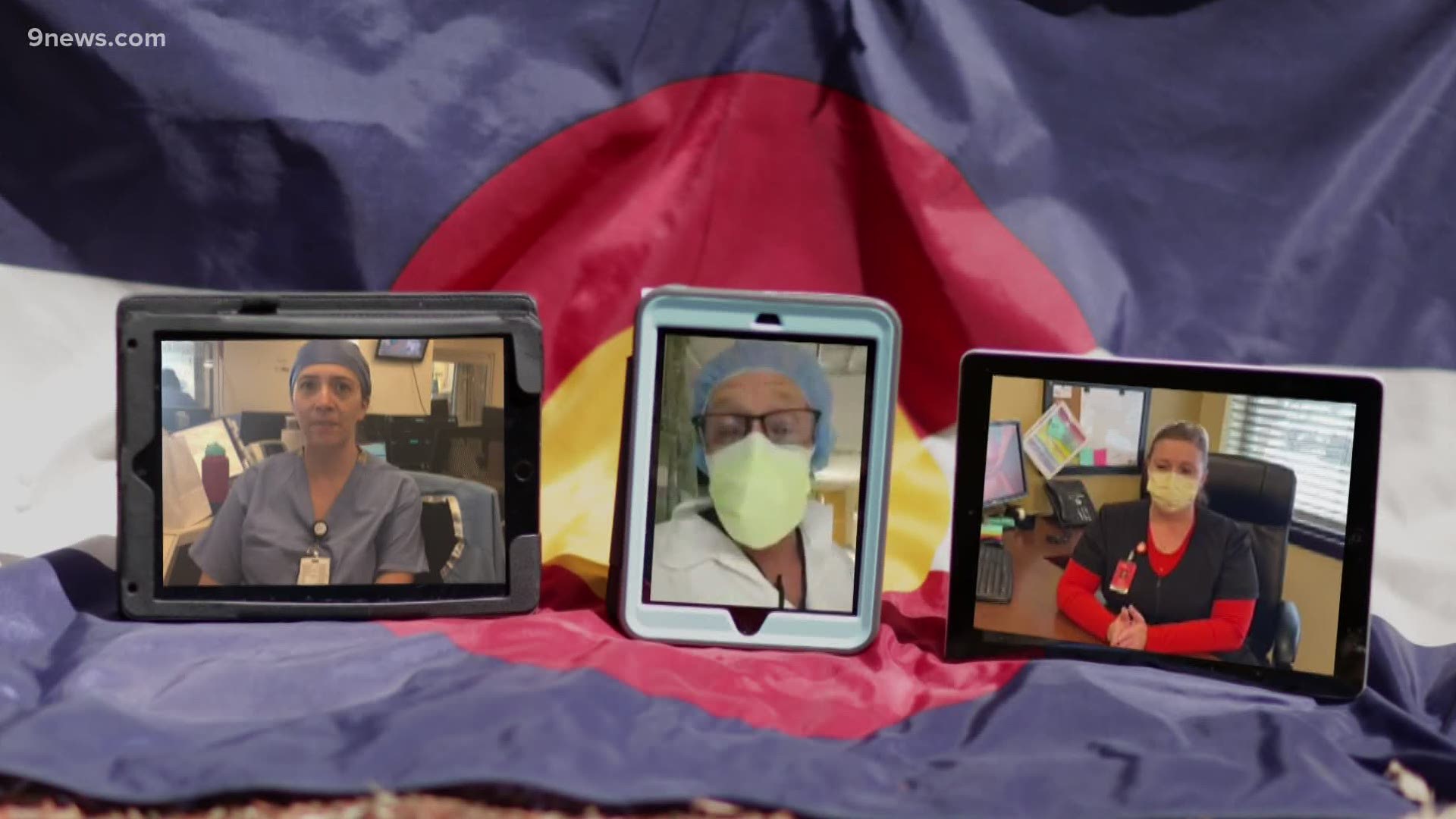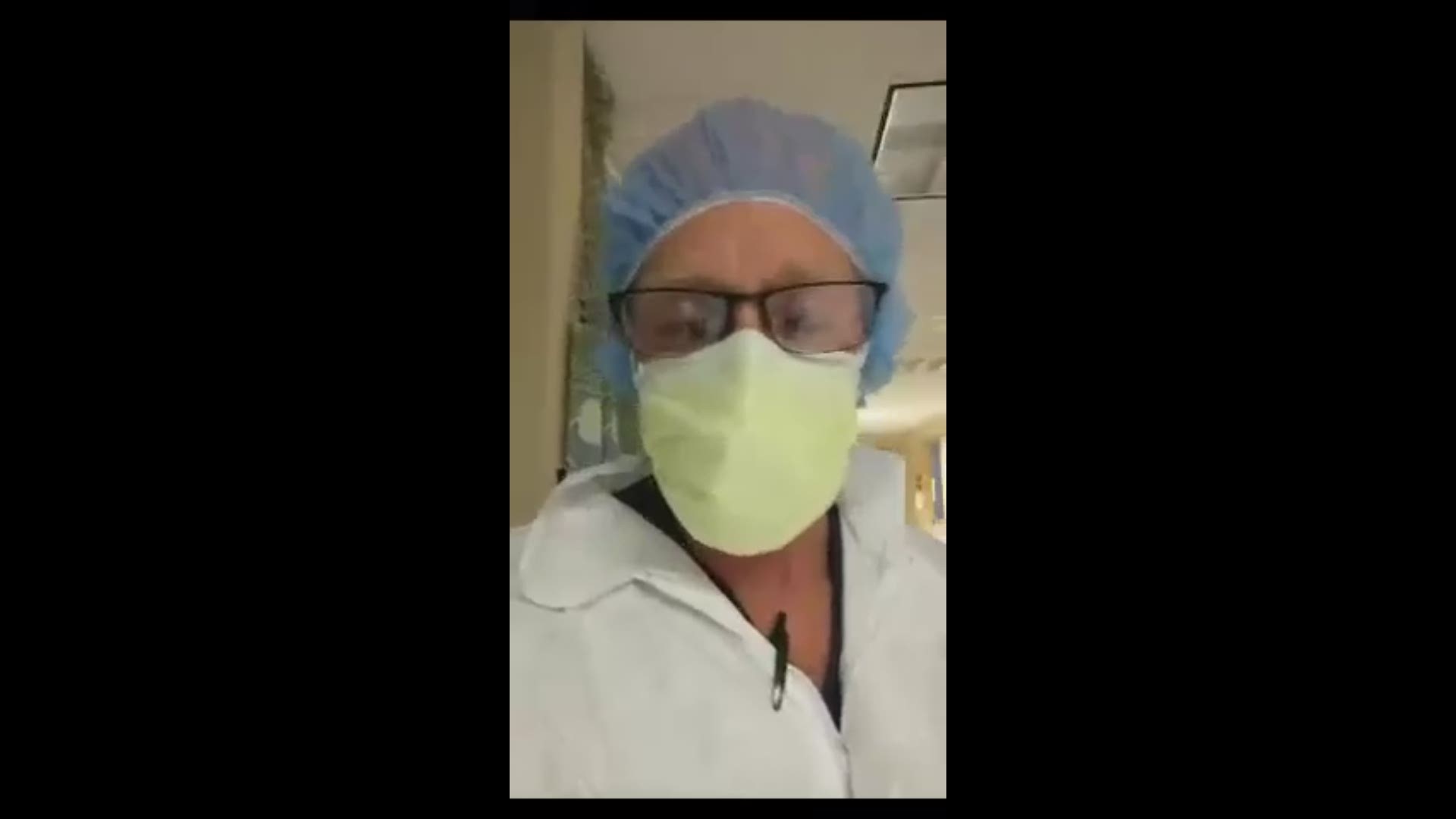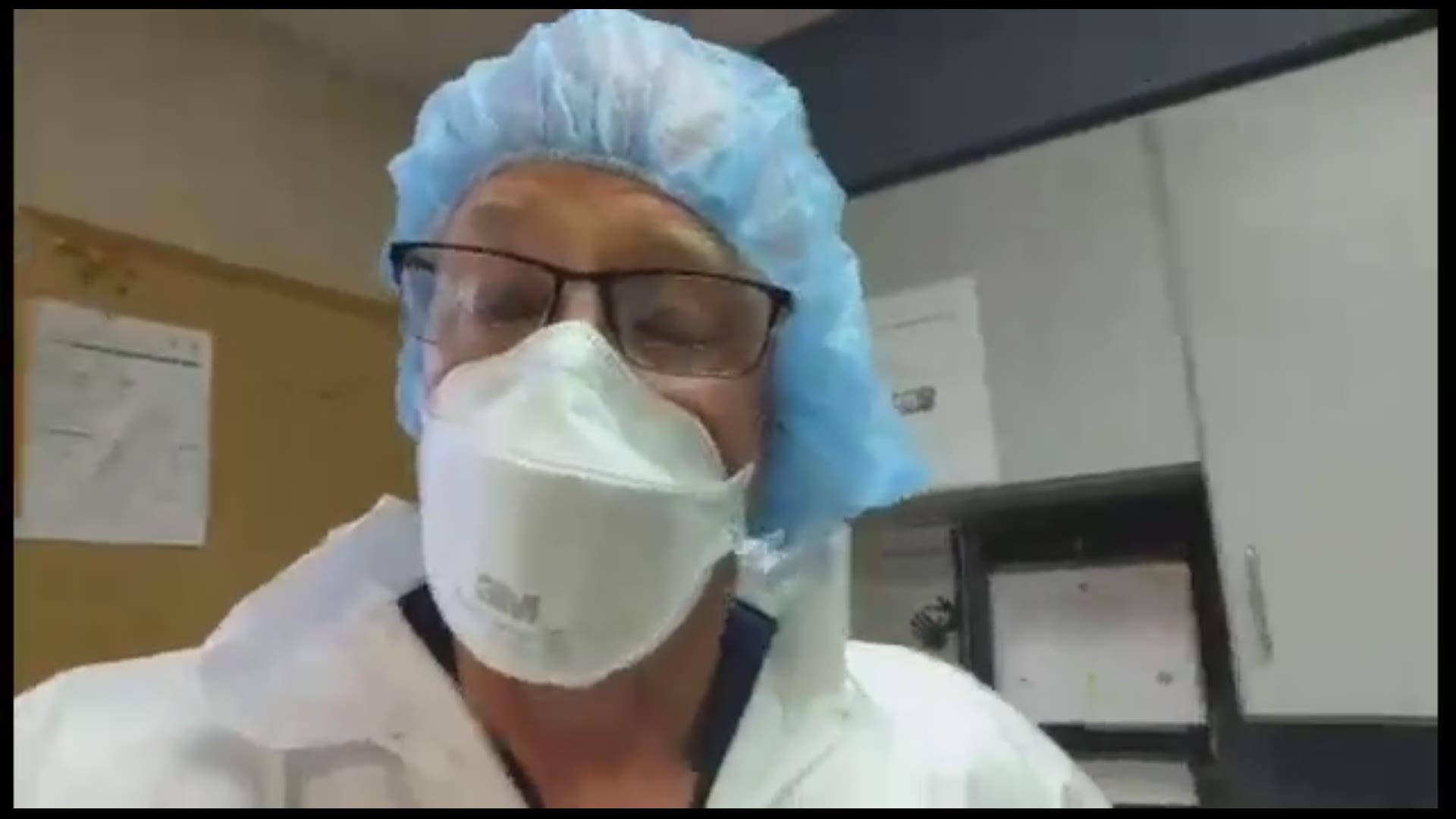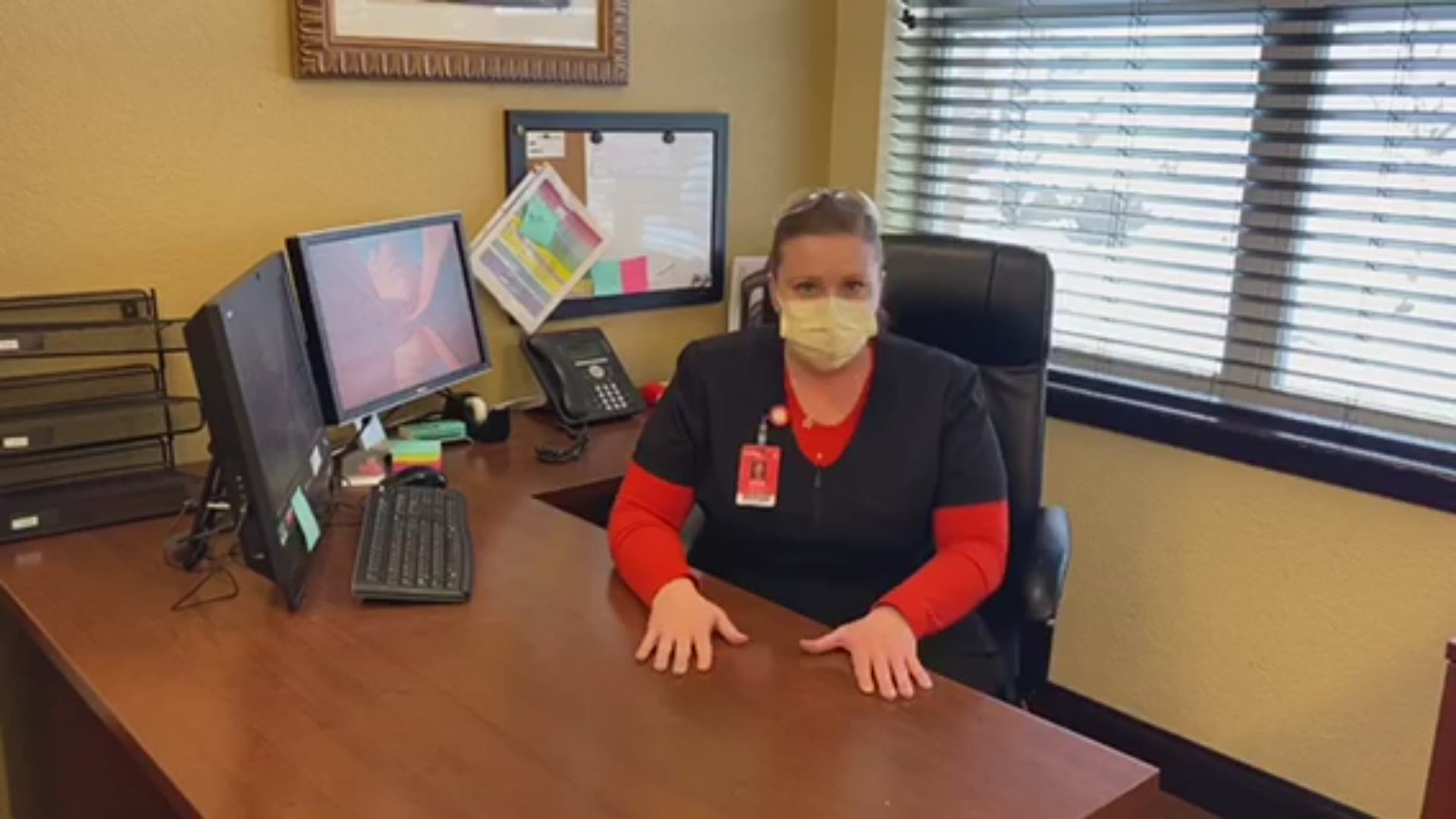DENVER — Three Colorado nurses on the front line of the COVID-19 pandemic shared what a day in their lives looks like.
That was on April 16 — 349 new cases of COVID-19 were reported in Colorado on that day, raising the states' total number of reported cases to 9,180, according to the Colorado Department of Public Health and Environment (CDPHE). Since then, that total has increased to 12,968.
Twenty-eight of Colorado's 672 deaths were reported on April 16, according to CDPHE.
There had been 2,014 total hospitalizations in Colorado reported by CDPHE by April 16, and that number has increased to 2,410.
> This story was done as part of the Colorado News Collaborative. 9NEWS joined this historic collaboration with more than 40 other newsrooms across Colorado to better serve the public in these trying times.
From Spanish teacher to ICU nurse — Erica Schick

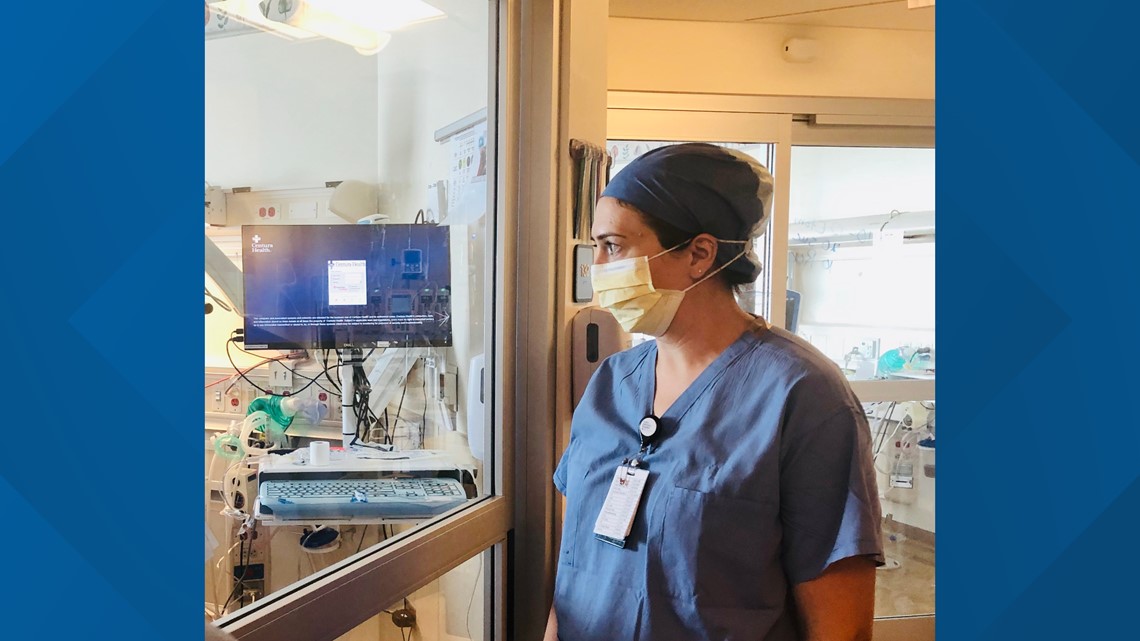
Erica Schick is a mother who decided on a drastic career change six years ago — today, she's working with COVID-19 patients in a busy intensive care unit.
“ICU nursing can be stressful, especially if you have a crashing patient,” Schick said over Zoom video. “And then you have it in the back of your mind you don’t want to get sick.”
While the 41-year-old nurse spoke, other nurses could be seen in the background, dashing from one end of the hallway to the other. They were adorned in heavy protective gear with tubes and transparent head coverings that made them look like astronauts.
“It’s such a new disease, new illness [that] we don’t know much about,” Schick said. “Things are changing with protection and how we do stuff. There's always new information.”
For a few minutes, amid the beeps of medical machines, Schick shared what life has been like in the eight-bed intensive care unit at Avista Adventist Hospital in Louisville.
“We’ve had patients from young to old that have been affected by it,” Schick said of the virus that causes COVID-19. “It’s been hard. There are definitely some days when I cry a lot.”
Ventilators are keeping her patients alive while she works non-stop to make sure the machines keep the oxygen flowing.
On this day, Schick expressed sadness over a female patient who was taken off a ventilator but then had to be put back on the machine after her breathing failed.
“It’s never easy to see, but I have also seen where we’ve had patients intubated and they walked out of here, so that’s a silver lining too,” she said. “Being in a hospital when you’re this sick, I feel it’s just so lonely too.”
While her patients have been separated from their families because of stricter visitation rules, Schick has also been separated from her kids and husband.
For the past three weeks, Schick’s 2-year-old and 5-year-old have been living with their father in Pagosa Springs so they won’t get sick, just in case she brings the virus home.
“It can be stressful...especially with an intubated patient where you’re in these aerosolizing procedures, and so the virus can get everywhere," she said. "You hear about New York, where nurses are getting sick."
About seven years ago, Schick was in a much different place.
Before working face-to-face with a deadly disease, she was a Spanish teacher who became fed up with the non-stop school work.
“I quit teaching because of stress," Schick said. "I was constantly grading, non-stop, even when I would go home. I couldn’t find a good work-life balance."
Six years ago, Schick became a nurse and found the profession extremely rewarding, especially now when she can watch patients recover from COVID-19.
Yet, the mental toll may be everlasting for this mother who finds herself alone and missing her family when she does have time off.
“I have done some house cleaning, and reorganizing, and getting smaller clothes out of my kids rooms," Schick said. "And just some days, if it’s a stressful day, I just lay around."
Meditation apps on her phone have helped, but Schick said she can feel the pressure at work change her mental health.
“I can tell my sleep is affected," she said. "I’ve never felt like I’m a super anxious person, and I feel like I’m much more anxious than I was."
Asked about the surge of patients, she said the level of work has recently been steady but ebbs and flows at times.
“I don’t think our normal will be normal again,” Schick said. “My biggest fear is, until we get a vaccine, what’s going to happen?”
RELATED: Has COVID-19 killed more people than we know? Health officials, coroners think that's highly likely
From Wuhan to Montrose, pandemic challenges rural Colorado nurse — Jeff Davis
An experienced nurse who lives and works in the rural community of Montrose said the virus has taken him out of his comfort zone.
Montrose is about 265 driving miles southwest of Denver.
After traveling thousands of miles, through major international cities and foreign countries, the novel coronavirus is even putting people in intensive care units in rural Colorado.
“Just small rural America,” Jeff Davis, a nurse, said over a Zoom meeting while describing the city of Montrose “If you go to the grocery store, and you’re out and about, you’re gonna bump into people.”
Davis, 54, will usually begin a 12-hour shift in the intensive care unit at 7 p.m. and walk out of the building when the sun is rising over the community of 19,500 people.
While his shift is busy, Davis said Montrose Memorial has the right equipment for nurses and doctors to handle the current patient load. There are 11 beds in the ICU, some of which have been full of COVID-19 patients living at the edge of death on ventilators.
Montrose Memorial serves as a hospital, not only for the city of Montrose, but for surrounding smaller cities and towns in other counties.
And unlike other mountain communities, Montrose didn’t experience a sudden influx of COVID-19 patients, Davis said.
“We didn't get hammered, all at once," he said. "We had a slow entry into this, and it let us formulate our system and how we are managing our care for these people."
There have been 89 confirmed cases and nine deaths in Montrose County, according to the state’s latest COVID-19 stats.
“I think the biggest thing that most people don’t realize is how quickly people fail,” Davis said of his patients. “Even after 33 years, I mean I got comfortable with my skill set, and these people make you think.”
When asked about his working environment compared to larger metropolitan hospitals, Davis said his patients are often people he sees at the local grocery store.
“In a small town, word of mouth is everything," Davis said. "So how you make your impression and start a relationship with people is everything. You’re gonna see them out in public again.
“I really think, when this is all said and done, I’m gonna be a better nurse for it. It’s taken me out of my comfort zone from what we normally see."
Skilled nursing fears amid COVID-19 pandemic — Kristi McCabe

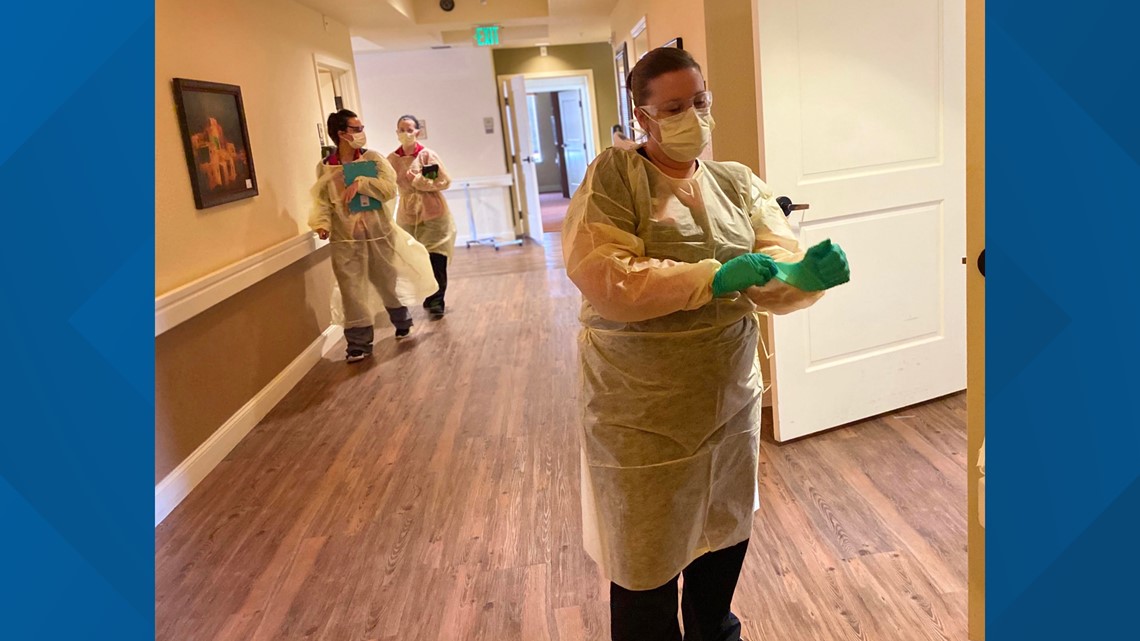
Every evening after her shift, nurse Kristi McCabe heads home and gets fully undressed just after she walks in the door.
Her 10-year-old daughter waits inside as McCabe immediately takes a shower with hopes the virus that causes COVID-19 hasn’t made its way inside her home.
“I will admit a few weeks ago, things were more scary. I had a few teary nights,” McCabe said through a Zoom video call from her workplace at PowerBack Rehab in Lakewood. “There's definitely an added layer of stress into things.”
PowerBack Rehab provides a rapid recovery alternatives for patients requiring post-hospital rehabilitation and medical services related to acute illness, surgery or injury.
McCabe has been a nurse for the past 20 years, most of them spent helping elderly populations. She spends her day helping patients in the 108-bed facility, and thankfully so far her workplace hasn’t seen any infections, she said.
“I really fell in love with the elderly population," she said. "There’s a certain level of respect that comes with that generation that you don’t really see with people of my age."
Trying to keep a sense of normal during abnormal times has been challenging as she now has to wear a mask, gown and face shield all day.
Before the pandemic, McCabe could move freely throughout the facility without any thought of social distancing among the residents.
And for patients’ families, it’s been a hard transition, McCabe said, after the state restricted nonessential visitation at skilled nursing facilities.
McCabe said families have been able to talk to their loved ones through things like Zoom and FaceTime at least three times a week.
“We really don’t want to isolate them from the families as much as possible," McCabe said. "We try to make everybody feel this is home and we are all family."
When it comes to her other family at home, it’s a challenge not to worry.
“The highlight of my day is going home everyday to see my daughter at the end of a rough day,” McCabe said. “Right now, these are some of the hardest days I’ve had, and I feel I can’t go home, I can’t hold my daughter without possibly putting her at risk.”
SUGGESTED VIDEOS | Local stories from 9NEWS

